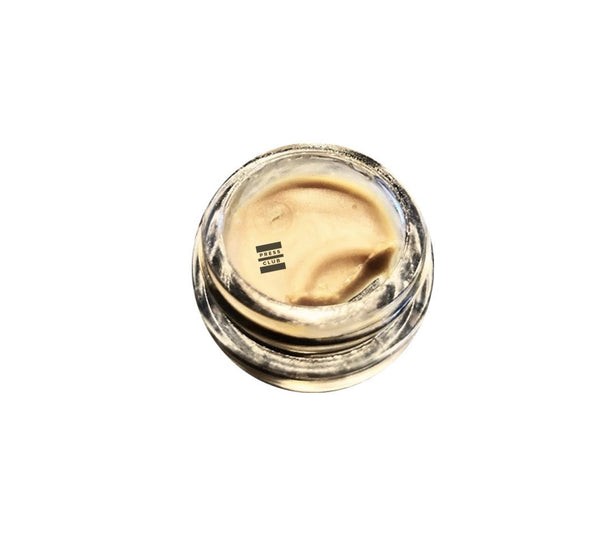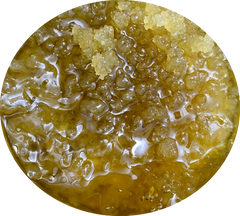Cold Curing vs Warm Curing Rosin


Todde Philips
🇺🇸 Retired veteran, father, rock-climbing expert & rosin connoisseur
✅ Updated 8/14/21
Curing rosin involves subjecting rosin to various temperatures within a sealed glass jar over time. The specific way in which rosin is cured has an impact on the flavor, potency, and consistency of the final product. How much heat (if any) is used, the length of time rosin remains pressurized inside the glass jar, how stirring/agitation is applied, and how long the rosin is left to cure before long-term storage all plays into the overall quality of the dab.
Extractors generally choose one of two main ways to cure rosin: cold curing or warm curing. Both types of cures are subsets of Jar Tech, which is the method of using a sealed glass jar to cure rosin with varying degrees of temperatures. The temperature applied to the rosin renders the Jar Tech method either a cold cure or a warm cure. Read more in-depth about Jar Tech here.
Cold Curing Rosin
Cold curing rosin usually takes place at temperatures between 40 and 70 degrees Fahrenheit. Cold curing can be done easily at room temperature between 60-70 degrees, which is a bit misleading due to the fact that room temperature isn’t necessarily “cold”.
A common approach to cold curing rosin is to simply leave rosin in a sealed glass jar at room temperature for 24 to 72 hours, or even up to one week. Watch the consistency transform as time progresses, opening the jar to give the rosin a stir to recombine any terpenes that separated. Cold curing helps the rosin transform into a more baddery consistency.
Cold curing minimizes the degradation and evaporation of terpenes during the curing process, which is an advantage over the exposure to heat with a warm cure. Stability of the rosin is often the goal with cold curing, meaning to create an even consistency and baddery texture that doesn’t separate over time.
The technique of whipping rosin is often used in conjunction with cold curing, which improves the stability of the rosin. Learn more about it in our article What Are the Benefits of Whipping Rosin?
There are many variations of the cold curing techniques, including curing rosin in the refrigerator with intermittent stirring/agitation. The key is to experiment with different variables and observe the transformation of your rosin over time.
Warm Curing Rosin
Warm cures occur in temperatures from around 90 to 135 degrees Fahrenheit. Heat expedites the degradation of both terpenes and cannabinoids in rosin, but it can also transform rosin into some truly incredible textures and flavor profiles.

A great way to warm cure rosin is using a tabletop heating pad set to ~100 degrees Fahrenheit. Direct the rosin flow into glass jars as it's extracted and seal the jar as soon as collection is complete. Keep the jar sealed throughout the cure to minimize terpene loss and oxidation.
Rosin can be warm cured for several hours. Start with an hour, check the consistency, and then go from there.
Left at room temperature for a day it will harden up into white crumble or golden cream. If it's still not cured just put it back on the heat pad, taking it off for a few hours and putting it back on. You can also use a dabber tool to whip/agitate it while it's hot and let it cool down to room temp to harden up, usually retaining that nice golden whipped color.
Another method of warm curing is to use rosin press plates. Place the freshly-collected rosin in a sealed glass jar between rosin plates heated to 125-135°f. Leave the jar to heat for several hours, noting changes in consistency.
The buildup of pressure inside the sealed jar aids in the separation of terpenes from the cannabinoid-rich oil. Over the course of several hours it’s common to see the rosin change consistency several times. Try whipping it with a dab tool every hour or so. We’ve seen some nice jammy-like consistency with our hash rosin when following this method.
Temperatures in the range of 135 degrees for curing rosin can be achieved with an oven, and is primarily reserved for hash rosin with the goal of creating diamonds and jams.

Curing Tips
A few things to keep in mind when you’re deciding to cold cure or warm cure your rosin:
- Cold curing is generally a good choice for flower rosin
- Hash rosin responds better to warm cures and can give you jams or diamonds in sauce consistency
- Condensation inside glass jars can reintroduce unwanted moisture into your rosin. When removing jars from the refrigerator, keep it sealed and at room temperature for about 15 minutes before opening the lid. You can even use a clean towel to carefully wipe any condensation from the inside rim of the jar.
- There’s no “one size fits all” formula to cure your rosin. It really depends on the unique characteristics of the rosin itself. Some cure fast, some cure slow, some do better without any heat, etc. Test different curing strategies and find what works best for your specific rosin.
- After curing with cold or heat treatments and recombining/agitation, keep rosin in sealed glass jars in the refrigerator for long term storage.
Conclusion
It’s tempting to overcomplicate the curing process with exact recipes and formulas for the perfect cure. In the end, every cure is so unique that it’s nearly impossible to replicate someone else’s results unless all variables are mimicked exactly (including source material, time, heat, and pressure during extraction, etc.). Keep in mind the fundamental variables of curing rosin but don’t stick too closely to a pre-subscribed method or formula.
Experiment with your own rosin and see what you come up with that works best for you. Whichever method delivers the best results for you is the right method. Keep an open mind. Measure your results and record your findings. Documenting and reviewing your findings will help you develop your own custom-made curing technique for the smoothest dabs imaginable.
Happy Curing!
Thoughts? Let us know by joining our secret Facebook group. Hang out with a community of like-minded solventless heads like yourself. Ask our head extractor questions, share your latest press and learn from hobbyists and experts in the industry.
FREQUENTLY ASKED QUESTIONS
What temperature do you use for cold curing rosin?
Cold curing rosin is generally done at room temperature, somewhere in the 60-degree Fahrenheit range. Keep the rosin under 65 degrees if possible. Refrigeration is not needed but optional, and if used be sure to prevent condensation from getting into the rosin after opening the lid.
What temperature do you use for warm curing rosin?
Warm cure rosin in temperatures between 90-130 degrees Fahrenheit, with temperatures in the lower side of that range being better for terpene preservation. Warm curing is great for hash rosin when you want a jam-like consistency.
What is better cold curing or warm curing rosin?
Cold curing is ideal when you want to optimize for terpene preservation and to achieve a badder-type consistency. Flower rosin and hash rosin both respond well to cold cures. Warm curing is best with hash rosin and when you want to see drastic changes in consistency like a jam or even diamonds and sauce.
Do you have to cure rosin?
Curing rosin is not absolutely necessary, but it does enhance flavor and smoothness and can transform texture and consistency.
How long do you cure rosin?
Cold curing can be done over the course of several days to a week. Warm curing is generally done for a couple hours up to a day or two. There isn't an exact formula for the perfect cure, and much depends on the cultivar you're using and what type of consistency you're aiming for.





1 comment
I’m curious about curing without agitation. I’m not interested in the smells and tastes of terepenes.
So my question would be can I separate those terepenes if I don’t agitate my extract, and would potency be effected?